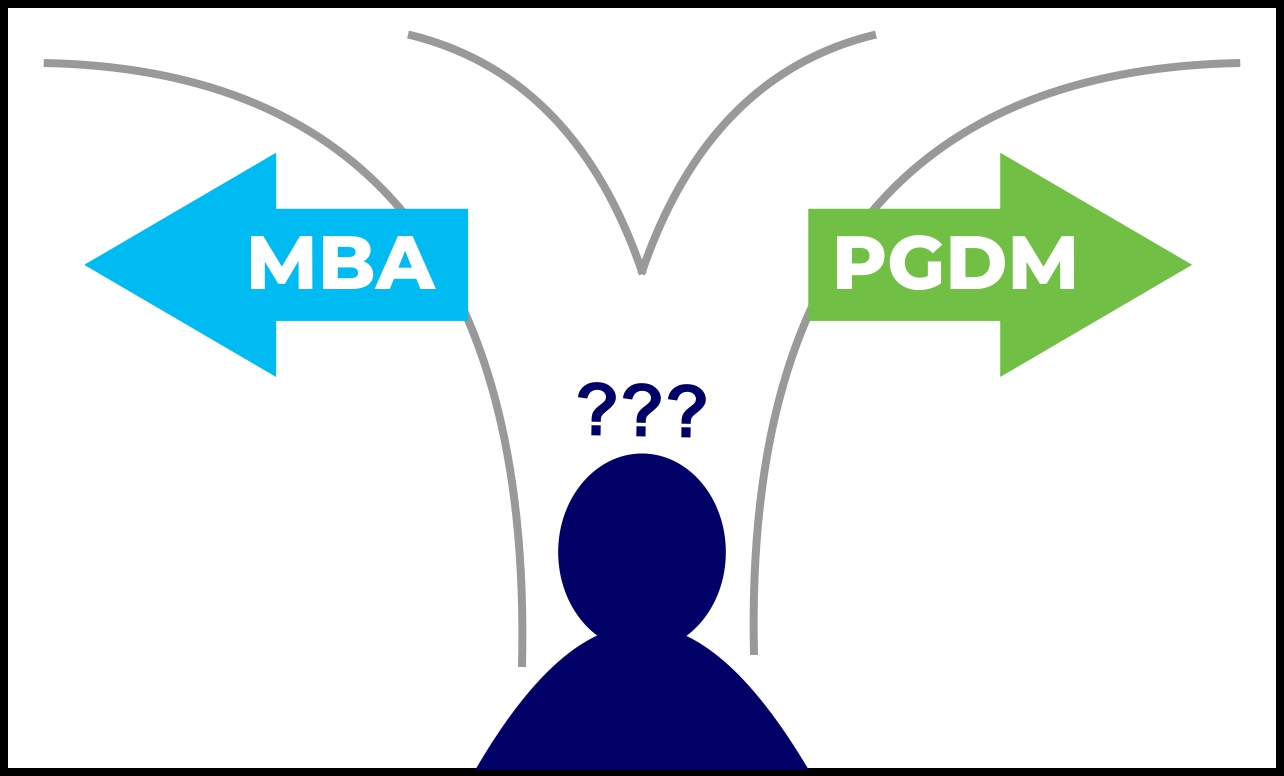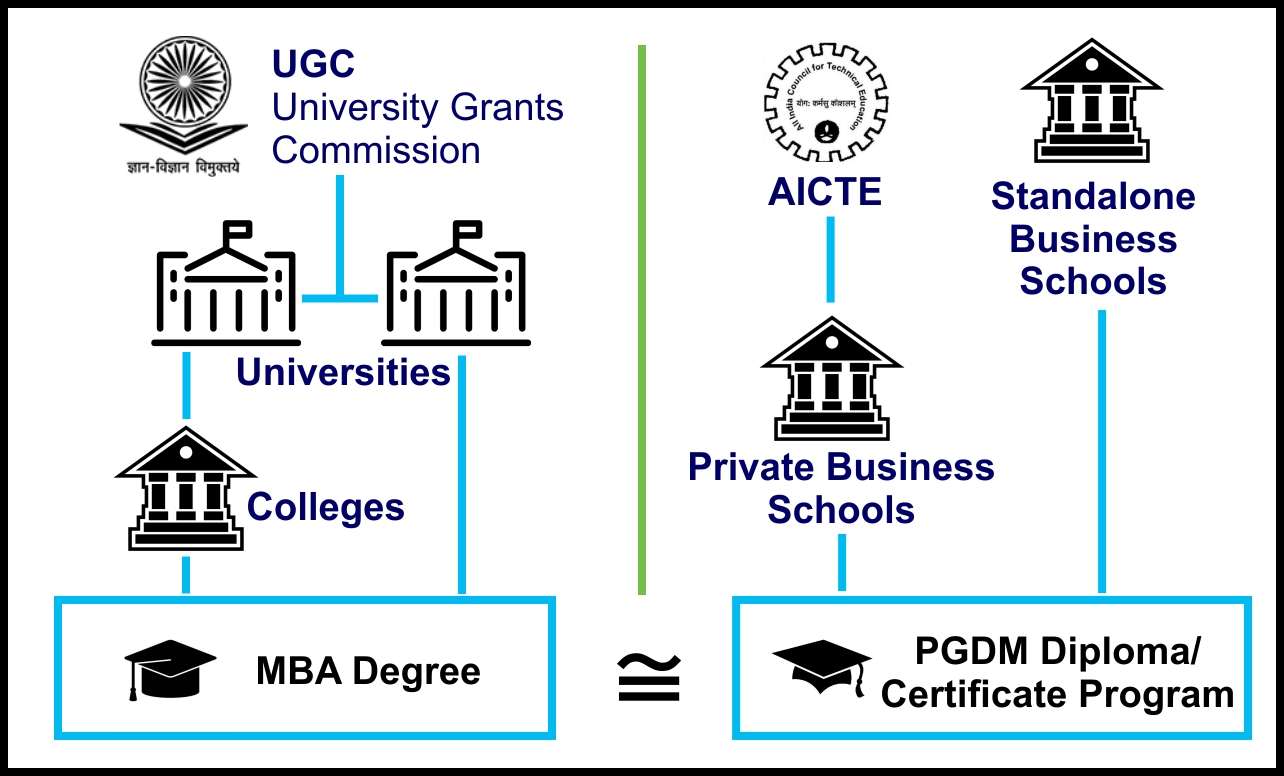What is the difference between MBA and PGDM?

MBA or PGDM? You must have pondered upon this question while you were searching for the ideal management program for you. Though what you’re essentially searching for is an MBA program, you realize that some of the business schools you really want to get into are actually offering a PGDM program instead. Why is it called PGDM, a diploma program, and not an MBA degree program?
Prima facie, MBA stands for Masters of Business Administration and PGDM for Post Graduate Diploma in Management. Though both the programs have a duration of two years and are offered by prominent B-schools to prepare aspirants for a lucrative management career, there are some significant similarities and differences between the two.
Let’s see how the MBA and PGDM are similar:
The MBA and PGDM do not differ when it comes to acceptance in the industry or for higher studies.
Both programs teach management skills, and it’s the quality of education imparted by the b-school, its unique value propositions, track record of its alumni and the value that the graduates bring to the table that matter to recruiters. In fact, in b-schools offering a one year ‘certificate’ program in management, also called PGPM or PGP or other names depending on the b-school, recruiters do not even differentiate between these students and the PGDM students. Hiring is done purely on the basis of work experience, background and skill requirements of the recruiter and how the students fit their criteria.
Also read: How is a One Year MBA good for experienced professionals.
The same can be said for pursuing higher education, such as a PhD or a Fellowship program. The PGDM Diploma is just as valid for pursuing a PhD as an MBA degree is. At the undergraduate level, a degree was always perceived to have a higher value as compared to a diploma. But in case of post graduate courses, such as management programs, the quality and value offered by the b-school and the program determine value, and not the nomenclature.
So what are the striking differences between MBA and PGDM?
In short:
Business schools (or private MBA colleges) offering PGDM can revise their curriculum in response to changing business needs and industry behavior. They can quickly adapt new models, tools and technologies to deliver cutting edge education to their students. Universities undergo such revision in a time-based manner, mostly in 3 to 5 years.
Private b-schools offering PGDM courses can also benefit students by inviting visiting faculty from around the world for an enhanced learning experience. In addition to these, business schools that especially offer an on-campus PGDM program also focus on overall development of students through soft-skill and leadership based courses and activities, extra-curriculars and an intense industry interaction through guest lectures.
If you are looking forward to investing two years of their life in any of these highly indulging programs, you must completely understand their value propositions, offerings and industry perception before making any decision.
The Long Story:
-
Degree vs Diploma:
The first and basic difference between the two programs is that the MBA is a Degree program whereas a PGDM is a diploma program. An MBA program is offered by a government or private university or a college affiliated with a university. Only these universities, which come under the University Grants Commission (UGC), can award degrees.
A PGDM program is offered by AICTE recognized b-schools and standalone/autonomous b-schools, under the Ministry of Human Resource Development (HRD), which do not come under the UGC. However, it is pertinent to know that the corporate world does not differentiate between the two. Graduates from both programs are equally eligible for the same kind of management jobs.
The 20 existing IIMs however, under the IIM act of 2017, were declared as Institutions of National Importance and were granted the authority to award MBA degrees, before which they were awarding diplomas just like every private b-school.
So, instead of the name, you must focus more on major quality determinants such as faculty, curriculum, campus, peer group, rankings and accreditations, and placements, to determine which program would put you in the searchlight of promising recruiters.

-
Curriculum:
MBA programs in general have a fixed curriculum and they are generally more theoretical in nature. There is a certain rigidity in the revision of curriculum to maintain pace with changes in the industry and economic landscape. Such revisions take place over a period of 3-5 years. Private universities like NMIMS and Symbiosis, however, update their curriculum more frequently.
PGDM curriculum, on the other hand, can be revised or updated at the b-school’s discretion, keeping it on par with new industry requirements and standards. This allows the schools to maintain a competitive advantage, and such competition encourages rampant innovation in curriculum and pedagogy. Such programs also have more room for practical application based learning in contrast to pure theoretical learning.
In fact, any good PGDM program would have involvement of industry veterans in designing the curriculum. These veterans bring foresight that encourage inclusion of emerging and disruptive technologies such as AI, Design Thinking and Business Analytics into management curriculum.
On these lines, one must also note that MBA exams are conducted by respective universities and all colleges under a particular university would have the same exams. In case of IIMs and private b-schools, the exams are conducted by the schools themselves who, to a great extent, have control over their evaluation criteria.
-
Teaching Methodology:
A high quality PGDM program offers a lot more than classroom teaching. Case study pedagogy has a high importance in PGDM courses as these cases help understand the application of concepts in real-time and are based on classic as well as contemporary business cases that have shaped the industry over the years. The learning takes place outside the classroom as well, in the form of extra-curricular activities, social initiatives, events, competitions, etc., for developing numerous soft skills essential for management professionals.
Students in a PGDM program also get a chance to interact with numerous thought leaders & CXOs during intense industry interface programs which help them gain industry perspective and blur the lines between theory and practical application. For instance, the PGDM program offered at Great Lakes Institute of Management includes live projects, summer internships with leading corporates, along with regular guest lectures, conclaves and symposiums – all of which help in developing strong leadership, managerial and analytical skills which are crucial for a successful management career.
-
Fee Structure:
Since MBA programs are offered by universities and colleges, most of which obtain grants from UGC and government subsidies, their fees are on the lower side. Faculty of Management Studies (FMS), one of the top MBA colleges in India, under Delhi University, charges INR 1.92 lakhs for its two year MBA program.
A PGDM program undoubtedly is a huge investment of money. Since institutes and autonomous business schools running PGDM programs, mostly on-campus, incur all their costs by themselves, the effect is seen in the form of much higher program fees. But, these fees are utilized to provide state-of-the-art infrastructure, enabling global faculty exposure, delivering cutting edge curriculum the grooming students bag highly coveted jobs. A number of banks and financial institutions provide loans at reasonable interest rates for such high quality PGDM programs.
-
Entrance Exam Criteria:
Both programs accept scores of various competitive tests such as CAT, MAT, GMAT, XAT & CMAT. In case of MBA programs, many universities and colleges also accept scores obtained in respective state level tests such as MAHCET, TSICET, PGCET & TANCET. A few top schools also conduct their own tests such as XAT (XLRI), SNAP (Symbiosis) & IIFT EXAM (IIFT).
There is no one-size-fits-all concept in case of entrance tests. The Indian School of Business (ISB), for instance, does not accept CAT scores, which is the most widely accepted one in India. PGDM schools may also not have a definite entrance score cut-off, but a safe score criteria since shortlisting would also depend on other factors such as past academic and professional performance, achievements, diversity of background, and so on. These test scores are a crucial entry point into schools of your choice. Therefore, you need to know which are the preferred test scores at those schools, and their cut-off or safe score requirements, and then prepare accordingly.
-
Your Goal:
Finally, what matters your ultimate goal in life. What is it that you want to do with your management qualification? What kind of career do you see for yourself in the future? This should be the major deciding factor for the choice of your program. You may also ask yourself what is your preference in terms of nature of the program (on-campus or otherwise), location, and immediate career outcomes? You might also want to consider how much you are willing to spend on it.
A PGDM course from any top school will surely land you a highly rewarding career. PGDM graduates might have some edge because of the pedagogy of the program and close industry interaction, helping them remain more pragmatic and relevant in the industry for longer. However, an MBA from a renowned college or university, with a long running reputation in the industry, can also help you achieve certain immediate career goals for a fraction of the cost.
PGDM at Great Lakes Institute of Management:
Great Lakes offers its top ranked AMBA accredited PGDM program at both its campuses – Chennai and Gurgaon. Keeping up with its relentless track record of being innovative and industry relevant, Great Lakes PGDM benefits from a cutting edge curriculum designed by highly acclaimed academicians and industry experts, such as Dr. Bala V Balachandran and Dr. Philip Kotler (Kellogg School of Management), Dr. Seenu V. Srinivasan and Dr. Hayagreeva Rao (Stanford GSB), Dr. Srikant M Datar and Dr. V. G. Narayanan (Harvard Business School), to name a few, on the Academic Advisory Council.
This year, Great Lakes Institute of Management has also offered a unique Term Zero to students admitted to both its full time Programs – PGDM and PGPM. This Term Zero has seen live interactions with a number of Thought Leaders including Padma Bhushan Dr. Sam Pitroda – Entrepreneur and Telecom Poineer, along with renowned professors from Harvard Business School, Stanford GSB, NYU Stern, Yale University and so on.
CXOs from around the world including Mrs. Indra Nooyi – Former Chairman and CEO of PepsiCo, Mr. Suresh Narayanan – Chairman and Managing Director of Nestlé India, Mr. Ananth Krishnan – CTO of Tata Consultancy Services also interacted with the students and shared their insights and perspectives.
Along with these interactions, Term Zero included a number of master classes and bootcamp courses across functions, tools and technologies, along with ice breakers and various team building activities for students to interact and learn together. This term was offered entirely online and as an additional component to the regular program in order to make the best use of time during the COVID-19 lockdown. The Term Zero was well received by students as a significant prologue to their management journey.
Subscribe now for regular updates!!
Know More about best Non-IIM MBA Colleges in India here: Top 10 MBA Colleges in India - Non IIM, 2023
About the Author:
Ms. Nidhi Saini is a Senior Manager for Corporate Communications at Great Lakes Institute of Management. She has been associated with Great Lakes for over 6 years and has been a key public relations liaison for the school. She has also forayed into the areas of Branding and Events through numerous Video Content, Alumni Engagement Initiatives, and even writing her own articles, having a penchant for storytelling and writing. With nearly 10 years of experience in working with numerous Education and Human Resources organizations and clients, including International Management Institute (IMI), Manipal University, Career Launcher and Randstad India, Ms. Saini comes with rich insights on the changing requirements of MBA aspirants and recruiters alike. Ms. Saini has also delivered a talk on “PR Tips for Start-Ups" at a seminar organized by GBG (Google Business Group).









